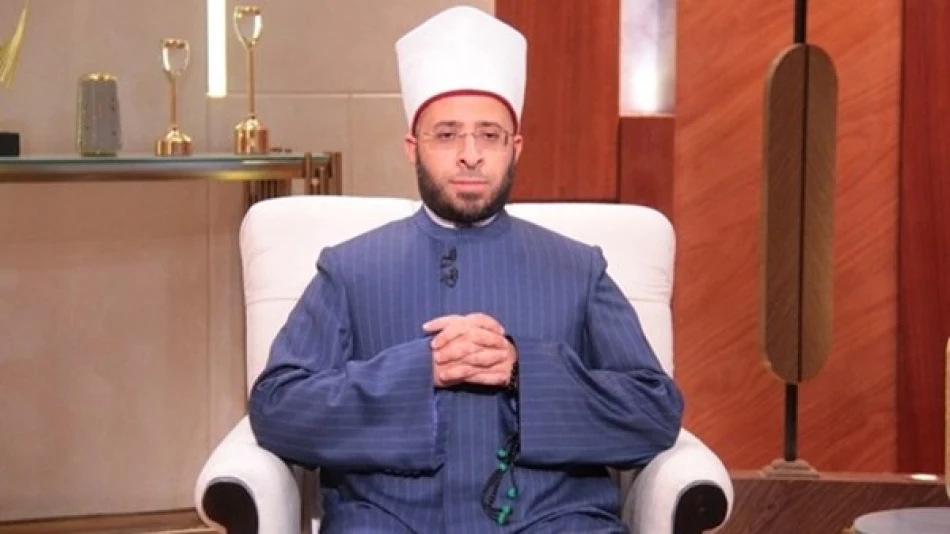
Egyptian Minister of Endowments: Terrorism Devastates Nations, Religious Renewal Extinguishes Extremism's Flames
Egypt's Religious Minister Calls for Islamic Reform to Counter Extremism at Historic Prophet's Birthday Celebration
Egypt's Minister of Religious Endowments has issued a bold call for religious renewal to combat terrorism and extremism, marking what he describes as a pivotal moment in Islamic history. Speaking at a ceremony attended by President Abdel Fattah al-Sisi celebrating the Prophet Muhammad's birthday, Dr. Osama al-Azhari emphasized that this year's commemoration marks exactly 1,500 years since the Prophet's birth—a milestone he argues presents a unique opportunity for comprehensive religious reform.
A Historic Milestone Demands Action
Al-Azhari positioned this year's celebration as fundamentally different from previous annual observances, noting that it falls at "the head of a century" in the Islamic calendar year 1447 AH. He referenced a prophetic tradition stating that "God sends to this nation at the head of every century someone who renews its religion," suggesting that this moment calls for transformative religious leadership.
The timing of this declaration is significant. Egypt has positioned itself as a moderate voice in the Islamic world, particularly through Al-Azhar University, one of Sunni Islam's most prestigious institutions. Al-Azhari's call for renewal reflects Egypt's broader strategy to counter the ideological influence of extremist groups that have destabilized the region over the past two decades.
Educational Reform as Counter-Terrorism Strategy
The minister outlined a comprehensive approach to religious education that integrates traditional Islamic scholarship with contemporary knowledge. He called for developing curricula that teach "integrated Sharia sciences, integrated reality sciences, and the sciences that connect them," aiming to produce scholars capable of addressing modern challenges through Islamic principles.
This educational philosophy represents a departure from traditional religious instruction that often separates theological study from practical application. By emphasizing the connection between religious knowledge and contemporary reality, Egypt appears to be addressing criticism that rigid interpretations of Islam have created intellectual gaps exploited by extremist movements.
Practical Applications
Al-Azhari envisions graduates who can "generate answers to all the questions, crises, challenges, problems, and perplexities of the age" by understanding complex modern relationships while maintaining religious authenticity. This approach mirrors educational reforms in other Muslim-majority countries like the UAE and Malaysia, which have sought to modernize Islamic education while preserving traditional values.
Ethics Over Ritual: A Strategic Emphasis
In a striking statistical argument, the minister noted that of approximately 50,000 prophetic traditions (hadiths), only 5,000 relate to rituals and religious obligations, while 45,000 focus on ethics, morals, and proper conduct. This emphasis on ethical behavior over ritual observance represents a significant shift in how Islamic teachings are prioritized and presented.
Al-Azhari identified key values driving societal development: innovation, sustainability, work ethic, beauty, competition, talent development, and scientific advancement. By framing these modern concepts as Islamic values, he's attempting to bridge the perceived gap between religious observance and economic progress—a challenge faced by many Muslim-majority nations seeking to balance tradition with development.
Regional Politics and Religious Authority
The minister concluded his remarks by addressing the Palestinian conflict, reaffirming Egypt's position supporting a Palestinian state based on 1967 borders with East Jerusalem as its capital. This statement, delivered in a religious context, demonstrates how Egypt uses its Islamic credentials to legitimize its foreign policy positions.
Egypt's approach contrasts with other regional powers that have used religious authority for different political ends. While Saudi Arabia has emphasized religious modernization through Vision 2030, and Turkey has leveraged Islamic identity for regional influence, Egypt appears to be positioning itself as the guardian of moderate, scholarly Islam capable of addressing contemporary challenges.
Implications for Regional Stability
Al-Azhari's call for religious renewal comes as Middle Eastern governments increasingly recognize that military solutions alone cannot defeat extremist ideologies. His emphasis on education and ethical development reflects a growing consensus that sustainable counter-terrorism requires intellectual and spiritual alternatives to radical interpretations of Islam.
The success of this approach will depend largely on implementation. Egypt's religious institutions, particularly Al-Azhar, possess significant influence throughout the Sunni Muslim world, potentially giving this reform agenda regional impact. However, translating these ideals into practical educational and social programs will require substantial resources and sustained political commitment.
The timing of this announcement, at what the minister describes as a once-in-a-century Islamic milestone, suggests Egyptian leadership views this as a historic opportunity to reshape religious discourse across the Muslim world.
Most Viewed News

 Layla Al Mansoori
Layla Al Mansoori






